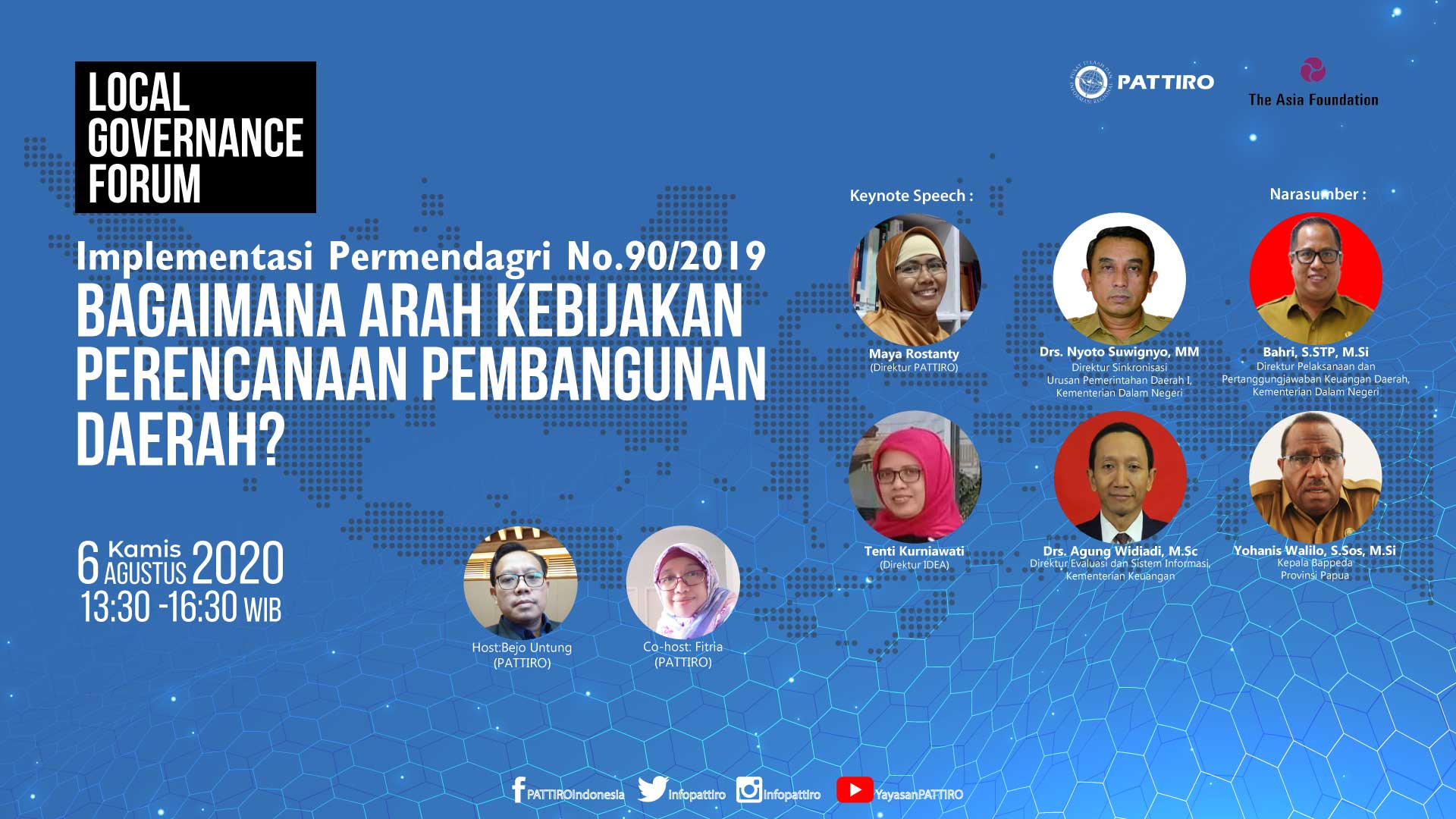
PATTIRO requested the Ministry of Home Affairs (Kemendagri) to postpone the enactment of Minister of Home Affairs Regulation (Permendagri) No. 90 of 2019 concerning Classification, Codification, and Nomenclature of Regional Development and Financial Planning. This suggestion is based on the fact that many local governments are not ready to adjust their regional budget codes and nomenclature. This statement was conveyed by PATTIRO Director Maya Rostanty in the Local Governance Forum (LGF), which was held online on Thursday, 6 August 2020 by PATTIRO in collaboration with The Asia Foundation.
The LGF, titled “Implementation of Ministerial Regulation No. 90 of 2019: What is the Direction of Regional Development Planning Policy?” was attended by more than 200 participants representing local governments, budget activists, universities, and other stakeholders. As resource persons in this activity were Director of Synchronization of Regional Government Affairs 1 at the Ministry of Home Affairs, Nyoto Suwignyo, Director for Regional Financial Implementation and Accountability at the Ministry of Home Affairs Bahri, Director for Evaluation and Information Systems at the Ministry of Finance Agung Widiadi, Head of the Center for Data and Development Analysis of Papua Province Andri, and the IDEA Director Tenti Kurniawati.
Further, Maya conveyed the concern that Minister of Home Affairs Regulation No.90 of 2019 will close the space for innovation that has so far appeared in various regions, and hamper programs and activities that are considered important to achieve regional development goals according to their characteristics. “The results of our mapping of the 2020 Papua Provincial Budget found 36 activities that were not accommodated by this Permendagri, even though these activities were very important in the Papuan context, because they were related to environmental and forestry affairs, spatial planning, and food security,” added Maya.
It is also feared that Permendagri No. 90 of 2019 will clash with the Government Regulation (PP) on Standard Accounts Chart (BAS) for Regions, whose design has been prepared by the Ministry of Finance. The PP on Regional BAS itself is mandated by PP No. 12 of 2019 concerning Regional Financial Management. “When later the PP is passed, and the substance does not correspond [with the Ministerial Regulation], regional governments will find confusion in the implementation. The experience of regional governments having to prepare two financial reports, one according to Ministerial Regulation No. 13 of 2006 and the other according to Government Accounting Standards should not happen again”, said Maya.
On the occasion Agung Widiadi stated that this PP is targeted to be completed this year.
Confirming Maya, Andri stated that the Permendagri seems to generalize all regions. In fact, each region may have different activities according to their needs. “In Papua Province, there is a Special Autonomy Bureau under the Regional Secretariat, but there is no code and nomenclature in the Permendagri. We were indeed given the opportunity to propose updating the code and nomenclature of programs, activities, and regional apparatus organizations. However, this process takes time, while on the other hand we have to fulfill the deadline of preparing the annual regional government work plans,” said Andri.
Based on these problems, PATTIRO requested the Ministry of Home Affairs to postpone the implementation of Permendagri No. 90 of 2019 until the local government has finished adjusting the code and nomenclature of APBD, and is waiting for the ratification of RPP BAS. In addition, PATTIRO also encourages revisions to Permendagri No. 90 of 2019 so that it is in sync with the RPP BAS and the revision of Permendagri No 13 of 2006, which is currently still ongoing.
Meanwhile, Nyoto Suwignyo said that Permendagri No. 90 of 2019 tries to ensure that regional authority is carried out as well as possible and there is no overlap. “This Permendagri is more concrete than Permendagri No. 13 of 2006, because it tries to ensure that the regions carry out their authority as well as possible. So far, local governments have been working on what should be the national government’s authority, while neglecting their own,” said Nyoto.
Further, Nyoto said that in fact, local governments are not hampered by innovation, because they are still given the opportunity to propose programs and activities to the Ministry of Home Affairs. Based on this proposal, the Ministry of Home Affairs will update Permendagri No. 90 of 2019, so that it is hoped that regional programs and activities can be accommodated in it. From the data submitted, until now only 60% of all local governments have submitted proposals, and of this number only 80% have been discussed and accommodated. “We are targeting this update to be completed within this year, so that local government budgeting for 2021 can already refer to Permendagri No. 90/2019 which has been updated,” said Nyoto.
IDEA Director Tenti Kurniawati said that the implementation of this Permendagri should pay attention to innovation in the regions. Many regions have developed adequate budgeting systems through a long process. “Do not let regional innovations in improving performance and in developing or overcoming gender disparities cannot be balanced. RPJMD and work plans can be accessed, but budget data are not disclosed. Therefore, the transparency aspect can be encouraged in relation to one data, “said Tenti.
At the end of the discussion, Bahri from the Directorate General of Regional Financial Implementation and Accountability of the Ministry of Home Affairs openly invited Agung Widiadi from the Directorate General of Financial Balance of the Ministry of Finance to discuss RPP BAS. (FM / BU)





